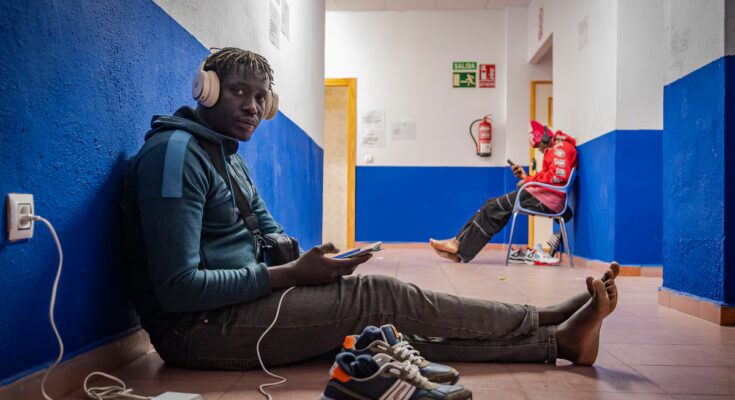History repeats itself in Jaén every time the olive harvest campaign appears. Dozens of people, mostly migrants, sleep every night on the street, in the open, due to the lack of public accommodation where they can spend the night while waiting for a job in one of the hundreds of pits scattered across the olive-growing geography. The only response they found when they arrived in this land was the attention they received from social and welfare organizations.
Meanwhile, institutions are stuck in a permanent political fray, unable to respond to a social conflict that repeats itself year after year in this sea of 67 million olive trees. The Junta de Andalucía, which heads the Provincial Migration Forum, has recommended the opening of the municipal network of shelters starting November 17, even though temporary workers began arriving several weeks ago. This situation has caused high migratory pressure in the capital Jaen, the entry point for these workers, which has forced the Municipality to bring forward the opening of municipal resources which, however, remain insufficient.
“The fact that a hundred people are sleeping on the street is shameful and unsustainable. It would be desirable for our public representatives to join forces and put aside sterile debates that do not serve to respond to this undignified situation”, said Fátima Jerez, coordinator of the Cáritas Interparroquial of Jaén. Last night, volunteers from this organization assisted 70 people sheltering in commercial passages, in ATMs, outside the bus station or even in the tunnel of the fairgrounds. Furthermore, in some porticoes of the La Alameda health center, a shantytown has been built for days where at least 40 people take refuge every night.
“We ask that the Andalusian government does not turn its back on the city councils and the most vulnerable people, in this case the migrants who come to work in the most important fruit of the province and where we are co-responsible in giving the best image to our flagship product, our olive oil,” said Jaén’s Social Affairs Councilor, Ángeles Díaz (PSOE).
The Municipality of the capital has already made available the 170 places of the municipal system and there are more than a thousand registered overnight stays, but it does so with its own resources. Díaz assures that the Council has established funding for Jaén for 45 days of operation when in reality there are 90. But of these 45 days, the Andalusian Government finances only 60%, which is why “it puts the municipalities on the brink of suffocation, because the funding does not cover real needs”.
The PSOE has urgently gathered its mayors to address this social conflict which threatens to worsen with the arrival of new temporary workers in the coming days. “It cannot be that the Council abandons the municipal councils with a decrease in funding that is already repeated every year. Last year the province received 460,000 euros for shelters and this year 422,000. Jaén is one of the most penalized by this cut together with Huelva and Almería, which is striking because they are the provinces that historically have had the greatest number of agricultural campaigns”, complained Ángeles Díaz, also Secretary of Social Policies. The policies of the PSOE. jiennense.
The Department for Social Inclusion, Youth, Family and Equality of the Junta de Andalucía, under the PP government, reacted by announcing 200 overnight stays in two hotels in the capital, in collaboration with the Jaén Acoge institution, to accommodate seasonal workers who have been sleeping on the streets in recent days. The territorial delegate, Ángela Hidalgo, explained that this is an extraordinary measure, characterized by the arrival of seasonal workers in the capital before the start of the pit due to the early completion of the harvest in Castilla-La Mancha. And Hidalgo adds that this problem is being responded to in the capital Jaén, “a specific case to which we provide a solution despite the fact that it is not a regional jurisdiction, but a municipal one”.

The Municipality of Úbeda has also activated an emergency device to welcome seasonal workers from the olive-growing countryside and thus prevent these people from sleeping on the streets. The measure was accelerated due to the forecast of low temperatures in the coming days and the fact that the provincial reception network will not open its doors until at least November 17.
This year, the province of Jaén has 14 shelters for temporary olive workers, a network that was a pioneer at the time in providing assistance to migrants seeking work in agriculture. These hostels, where users can stay for up to four nights, offer a total of 557 places, but the Council has recommended that municipalities open from 17 to 21 November.
Last season there were more than 5,000 users of temporary shelters in the province, including 2,000 in the capital Jaén, and more than 12,000 overnight stays were registered. Every year, the Provincial Immigration Forum sends the message that the arrival of foreign workers is unnecessary, given the existence of more than 35,000 unemployed in the province of Jaén and because drought has reduced harvests in recent seasons. But migrants ignore these messages and go year after year to a province where, according to the capacity of the Ministry of Agriculture, 3.8 million wages are expected for the olive harvest.
“Looking the other way and clinging to pre-established deadlines is not the response that, as a society, we expect from our public representatives. We must guarantee the dignified treatment that every person deserves,” says Fátima Jerez, head of Cáritas of Jaén. Other organizations present at the Migration Forum ask to update the current reception model and, above all, to review its openness. They argue that the olive growing season is being brought forward more each year due to the boom in early harvest oils, which begin to be harvested in mid-October.



